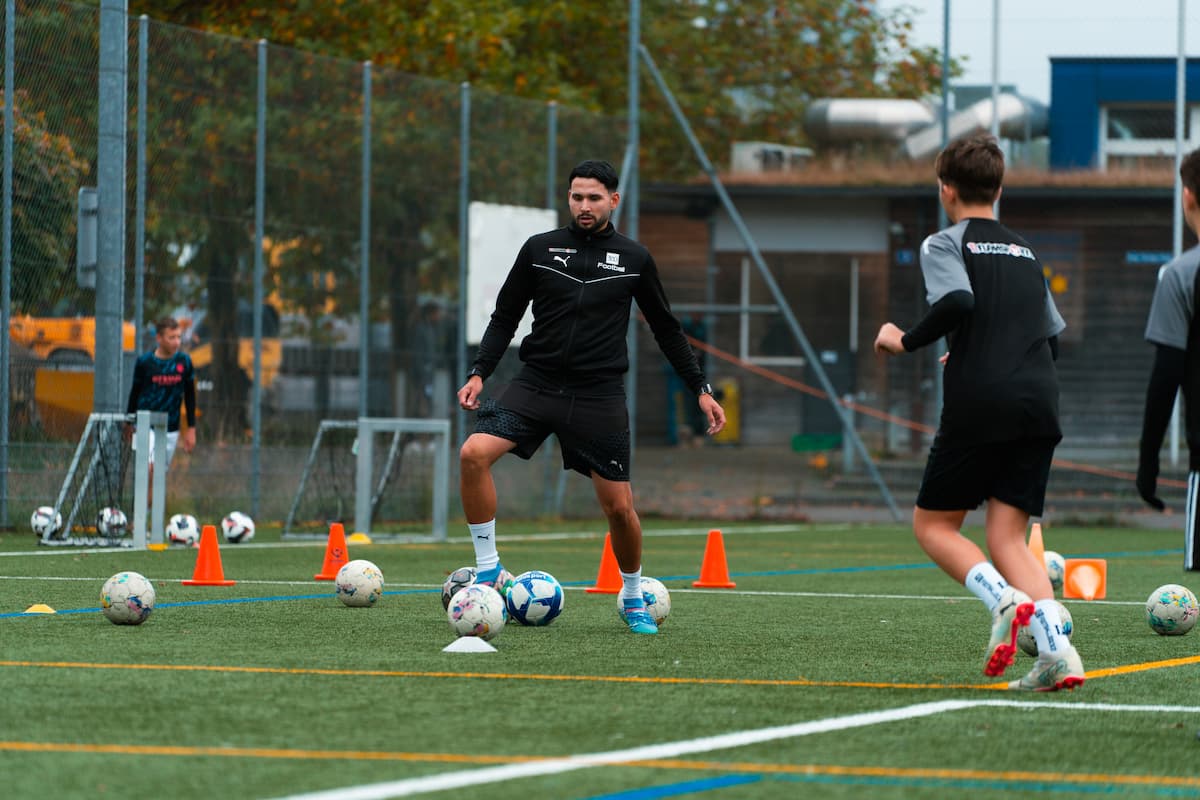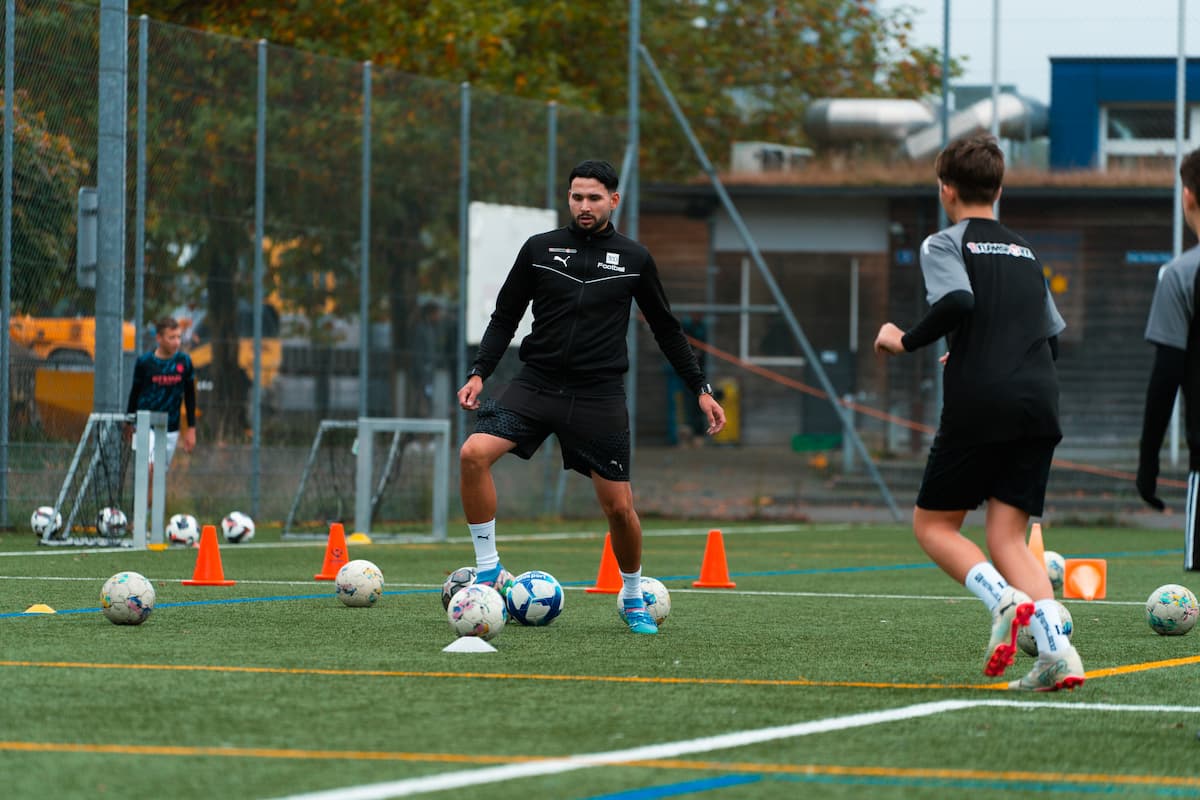In the first part on the topic of central defenders, it was highlighted that as a central defender you also have to have some qualities with the ball - especially for build-up play. The central defender plays a very central role in building up the game in modern football. As a central defender, you have the responsibility to get the ball to your teammates in a controlled manner through sharp, precise and long-range passes.
If you haven't read the first part yet and want to find out how you can become a "modern" playmaker as a central defender, click on this link: https://www.360football.ch/blogs/trainingsblog/innendefender-der-moderne-spielmacher -Part 1
But even if, as a central defender, you play a major role in shaping your team's offensive game, this should of course not be an excuse to neglect your tasks in the defensive game.
Defending collectively
But when it comes to playing against the ball, you are not on your own. Because in times of ball- and space-oriented defense, the ball is conquered collectively. This means that you get support from your teammates when fighting for the ball. At the same time, you are not only responsible for an opponent, but also for every attack by the opponent - so you and your teammates no longer play against the man, but you defend the space together and win the ball together.
Communication on the pitch
In order for defending to work as a team, your team needs good communication on the pitch - especially with your teammates in the back four. Because only if your behavior is perfectly coordinated will collective defense have a positive effect. Effective communication on the pitch will help your back four to act at the same height, move together to the left and right or fall back together when a long ball is imminent. On the other hand, if you don't act in a unified manner, chaos will arise in your chain and space for your opponents. Therefore, communication on the pitch should be given great importance.
In order for communication to work on the field, you should make sure that your commands...
- ...speak loudly and clearly. A lot of noises can be heard on and around a football field. For this reason, you have to give loud instructions so that the full-back on the side far from the ball can hear you.
- ..give short but clear instructions. Use unambiguous statements like, “Fall!” or “Push out!” instead of speaking in complete sentences. If you explain to your teammates in detail how to act in a game situation, it is usually already too late. By the time you have finished your long sentence, the opponent will have already overcome your back four. It's best to ask your coach which clear but unambiguous commands you should use on the pitch to coach your teammates.
- ...you want to support your teammates instead of just putting them down. On a football pitch it is quite normal for a rough and coarse tone to prevail. But your commands should also be helpful. So don't just tell your fellow player that what they did was bad, but also give them tips along the way. With this help, the next situation can be mastered better immediately. Because if you have the intention of becoming a leader, it is not enough to just make loud but meaningless announcements. As a captain, you also need an understanding of the game, which you can convey on the pitch.
A central defender who has a lot of understanding of the game and, above all, experience is professional footballer Timm Klose. Regardless of whether it is the Bundesliga, Premier League or Super League – he has been playing at the top level for many years. Get valuable tips from experienced central defender Timm Klose in this video:
Duels & positional play
It can be said that modern defense primarily works collaboratively by making the spaces near the ball narrow. Effective communication on the pitch is also required so that the defense can act as a well-organized, collective unit.
However, the uniform game against the ball should not be misunderstood. Because even if you try to conquer the gaming device together, you will still be in many 1 on 1 situations.
As a central defender, you will often go 1-on-1 against attackers who have their backs to you and the goal. However, these duels against attackers do not just begin with the striker's first contact with the ball. The 1 on 1 starts before the pass.
The overlapping ceilings
With good positioning you can win the ball before the striker makes the first contact. Overlapping your opponent will help you with this. So you don't stand directly behind the attacker, but slightly to the side of the ball.

For example, if an opposing midfielder has the ball in the half-space, you position yourself slightly to the outside of your opponent. As soon as or shortly before the pass takes place, you can surprisingly break away from your opponent's back and intercept the pass.
“If I have to make a tackle, I have already made a mistake” – Paolo Maldini
However, be careful that the opposing attacker does not place his body in the passing path and let you run into space. You should be sure that you can intercept the pass. An attacker in front of the back four with his back to the goal is a much smaller problem than a striker who is already between the goal and the defense.
So if you notice that you can't intercept the ball safely, just take a step inwards again, towards the back of your opponent.
But if you have already decided to take a step forward, good body tension will help you if the attacker tries to force you out of the passing path.
In order to physically assert yourself against your opponents, you need strong core muscles. These exercises will help you get a strong core so you can assert yourself robustly in a duel:
Header game
A certain level of robustness not only helps you in duels on the ground, but also in the air. Being able to prevail in aerial duels is particularly important as a central defender. An aerial duel in midfield can determine possession of the ball, but winning an aerial duel after a cross can mean that you have prevented a goal. As a central defender, you will regularly take on the important duels in the air near the goal due to your central, defensive position.
In addition to physical robustness, other factors also determine whether you win a duel for a high ball. As a central defender you will gain air supremacy when...
- ...you find the right timing when jumping - Ideally, you hit the ball at the highest point in the air. At the same time, it can also be beneficial to jump in front of your opponent. This makes it easier for you to assert yourself in a duel. Through regular header training – both with and without an opponent – you will develop perfect timing for headers.
- ...jump off powerfully. Sometimes centimeters can determine whether you win a duel in the air or whether you reach the ball. This is another reason why you should work on your jumping ability, especially as a central defender.
- ...you are close to your opponent and position yourself between the goal and the opponent. Try to constantly keep an eye on the ball and your opponent and be prepared for running feints from your opponent. This allows you to react as quickly as possible to a sudden attack by your opponent, block the running path using fair means and stay on the inside lane.
- ...you disturb your defender when heading the ball, even if you can't get to the ball. Due to body size and position, it is sometimes no longer possible to head the ball before the opponent. However, it makes a huge difference whether you let your opponent headbutt undisturbed or use fair means to hinder him from headbutting. By actively conducting the aerial duel, it becomes extremely difficult for the opponent to head accurately and powerfully.
A good heading game is becoming more and more important in modern football - also because more and more goals are scored from set pieces. It is not uncommon for games at the top level to be decided by a header from a corner or a free kick.
In order to successfully defend as a central defender from crosses, free kicks and corners and to regularly become a goal scorer from your own set pieces, you should work on your jumping ability and your heading technique. These two exercises will help you become really strong in heading the ball:
Bounce:
Header technique:
About the author:
Luis Österlein (Twitter: LOsterlein ) is a game analyst for the U23 team at FC Bayern Munich and a freelance author. In close collaboration with 360Football, he writes specific blog posts that support players in their football development support.
![Innenverteidiger - Der moderne Spielmacher [Teil 2/2]](http://www.360football.ch/cdn/shop/articles/innenverteidiger-der-moderne-spielmacher-teil-22-182460.jpg?v=1701710505&width=1024)

